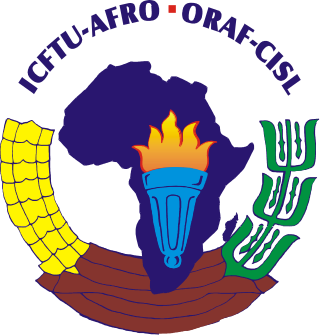Related Research Articles

The International Confederation of Free Trade Unions (ICFTU) was an international trade union. It came into being on 7 December 1949 following a split within the World Federation of Trade Unions (WFTU), and was dissolved on 31 October 2006 when it merged with the World Confederation of Labour (WCL) to form the International Trade Union Confederation (ITUC).

The World Federation of Trade Unions (WFTU) is an international federation of trade unions established in 1945. Founded in the immediate aftermath of World War Two, the organization built on the pre-war legacy of the International Federation of Trade Unions as a single structure for trade unions world-wide, following the World Trade Union Conference in London, United Kingdom.

The World Confederation of Labour (WCL) was an international labour organization founded in 1920 and based in Europe. Fascist governments of the 1930s repressed the federation and imprisoned many of its leaders, limiting operations until the end of World War II. In 2006 it became part of the International Trade Union Confederation (ITUC), ending its existence as an independent organization.
Education International (EI) is a global union federation (GUF) of teachers' trade unions consisting of 401 member organizations in 172 countries and territories that represents over 30 million education personnel from pre-school through university. It is one of the world's largest sectoral global union federations.

The ICFTU African Regional Organisation (AFRO) was a regional organisation of the International Confederation of Free Trade Unions (ICFTU), representing trade unions from countries in Africa.

The ICFTU Asia and Pacific Regional Organisation (APRO) was a regional organisation of the International Confederation of Free Trade Unions (ICFTU), representing trade unions from countries in Asia and Oceania.

The Ghana Trades Union Congress is a national centre that unites various workers' organizations in Ghana. The organization was established in 1945.
The Somali Confederation of Labour was a national trade union centre in Somalia. CSL was founded in 1949. CSL was closely linked to the ruling Somali Youth League, but retained organizational independence.
The Plantation Workers International Federation was an international trade secretariat of the International Confederation of Free Trade Unions. PWIF was founded at the firth ICFTU world congress held in Tunis in July 1957. Samuel Powell Claret was appointed as the general secretary of PWIF and Tom Bavin as its Director of Organisation. PWIF was launched by ICFTU to organize plantation unions in the Third World.
The International Arts and Entertainment Alliance (IAEA) is a global union federation (GUF) representing trade unions of performers and technicians in the music and audiovisual sectors.

The International Graphical Federation (IGF) was a global union federation bringing together unions of printing workers around the world.

Bruno Storti was an Italian trade unionist and politician.
The International Federation of Petroleum and Chemical Workers (IFPCW) was a global union federation bringing together trade union representing workers in the chemical and oil industries.
The International Federation of Free Teachers' Unions (IFFTU) was a global union federation of trade unions representing teachers.
The International Secretariat of Entertainment Trade Unions (ISETU) was a global union federation bringing together trade unions representing workers in the arts, media and entertainment industries.

The International Federation of Actors is a global union federation bringing together trade unions representing actors.
The International Federation of Trade Unions of Audio-Visual Workers was a global union federation bringing together unions representing film and television technicians and related workers.
The ICFTU European Regional Organisation (ERO) was a regional trade union confederation, bringing together national federations of trade unions in Europe.
The French Federation of Book Workers was a trade union representing printing workers in France.
The All Pakistan Confederation of Labour (APCOL) was a national trade union centre in Pakistan. It was formed in 1950 through a merger of PFL and EPFL and in the following years became the dominant trade union centre through government sponsorship. In the 1960s, it dissolved into PNFTU, APFOL and APFTU.
References
- 1 2 3 Goldberg, Arthur (1960). Directory of International Trade Union Organizations. Washington DC: United States Department of Labour. pp. 19.1–19.5.
- ↑ Fattmann, Rainer (2002). The Long Road Towards Cooperation (PDF). Bonn: Hans Böckler Foundation. ISBN 3-89892-047-X . Retrieved 22 October 2019.